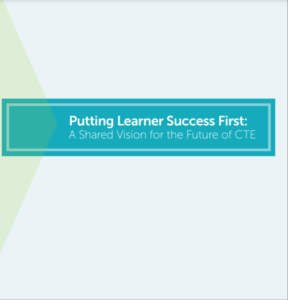Two years ago, Advance CTE launched the Advancing Postsecondary CTE Data Quality Initiative (PDI), supported by ECMC Foundation. Through the initiative, five grantees have received funding, technical assistance and access to a national peer learning network to:
1) Examine critical problems of practice and;
2) Implement innovative solutions to improve the quality, and use of postsecondary CTE data.
Grantee states and agencies include the: Alabama Community College System (ACCS); Delaware Department of Education; University of the District of Columbia Community College; Florida Department of Education, and; Oregon Higher Education Coordinating Commission.
By supporting states to improve their postsecondary Career Technical Education (CTE) data quality and use, Advance CTE is attending to a foundational commitment – actionable, transparent and trustworthy data – in Without Limits: A Shared Vision for the Future of Career Technical Education (CTE Without Limits). Each of the five foundational commitments are critical to states’ abilities to enact the Vision principles. Actionable, transparent and trustworthy data underlies a coordinated, learner-centered career preparation ecosystem.
About the Briefs
 In the coming months, Advance CTE will release a series of four briefs to share strategies put in place by the PDI states to advance postsecondary CTE data quality and use. The first brief explores how postsecondary CTE data can be used in support of state education and workforce goals, and features Alabama and Florida.
In the coming months, Advance CTE will release a series of four briefs to share strategies put in place by the PDI states to advance postsecondary CTE data quality and use. The first brief explores how postsecondary CTE data can be used in support of state education and workforce goals, and features Alabama and Florida.
 The second brief advances a theory of change for centering learners in postsecondary CTE data collection and use, featuring the District of Columbia and Oregon. The topics of briefs three and four will be fostering a positive culture of data use among CTE stakeholders and building a strong data infrastructure across systems and silos, respectively.
The second brief advances a theory of change for centering learners in postsecondary CTE data collection and use, featuring the District of Columbia and Oregon. The topics of briefs three and four will be fostering a positive culture of data use among CTE stakeholders and building a strong data infrastructure across systems and silos, respectively.
Shared Challenges
As with many projects underway over the last two years, states’ implementation of their PDI action plans were challenged by staff-level capacity constraints due to the coronavirus pandemic. However, many of the grantees’ plans were validated by the context of the pandemic, which demonstrated the critical nature of effective – and data-driven – career preparation systems to meet states’ education and workforce goals.
An evergreen challenge that the PDI states wrangle with is how best to build well-integrated data systems across the silos of state agencies and in collaboration with postsecondary institutions. Further, examining and implementing ways to more effectively communicate CTE data continues to be a priority.
Common Strategies for Success
Despite these challenges, each of the grantees has demonstrated a commitment to improving postsecondary CTE data to improve learner outcomes. All five states have used stakeholder engagement processes to drive the development and use of new data elements or reports. And each has invested in professional development strategies to foster a strong culture of data use.
Visit the Learning that Works Resource Center to read the first two briefs and for additional data and accountability resources
Candace Williams, Data and Research Manager




 The national crises of the past year has brought to the forefront issues that have held learners and workers back for too long. Our new vision, CTE Without Limits, will be released next week and is inspired by the ideas of more than 200 CTE leaders and partners that participated at our
The national crises of the past year has brought to the forefront issues that have held learners and workers back for too long. Our new vision, CTE Without Limits, will be released next week and is inspired by the ideas of more than 200 CTE leaders and partners that participated at our  A little over one year ago, Advance CTE launched
A little over one year ago, Advance CTE launched  In order to deliver high-quality CTE for all learners, state systems must work together at every level. Secondary and postsecondary must work together and with agencies that handle workforce and economic development issues. All of those agencies must also engage with employer partners and local districts and institutions to inform the design, validation and implementation of CTE programs.
In order to deliver high-quality CTE for all learners, state systems must work together at every level. Secondary and postsecondary must work together and with agencies that handle workforce and economic development issues. All of those agencies must also engage with employer partners and local districts and institutions to inform the design, validation and implementation of CTE programs.